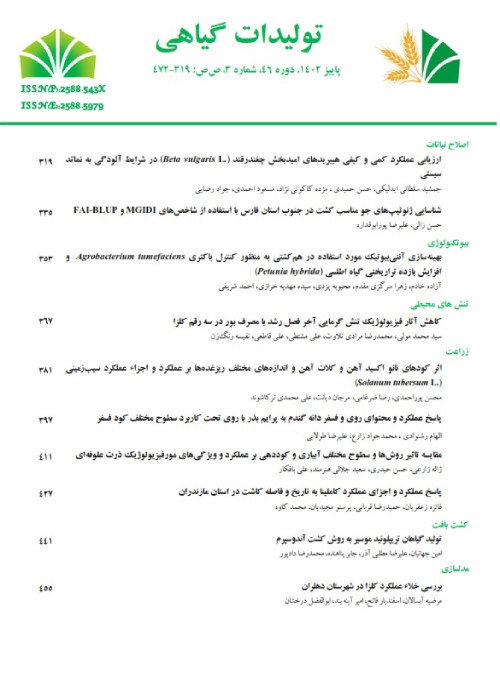Response of New Genotypes of Rapeseed (Brassica napus) to Late Season Withholding Irrigation under Semi-Arid Climate
Author(s):
Article Type:
Research/Original Article (دارای رتبه معتبر)
Abstract:
Background and Objectives
Water deficit stress is one of the most important environmental stresses which affect the crop production. Genetic improvement or application of drought tolerant genotypes is recommended to increase crop production under water restricted conditions. The objective of the current study is investigating the withholding irrigation effect in terminal stages of the growing season on agronomic performance of rapeseed new genotypes in a semi-arid climate.
Materials and Methods
The experiment was conducted during 2015-2016 growing season in Karaj, Iran. Experimental factors (two water irrigation regimes and 17 rapeseed genotypes) were investigated with factorial arrangement of treatments based on a randomized complete block design (RCBD) with three replications. In this study, several different traits including plant height, number of siliqueper plant, number of grain per silique, 1000-grain weight, grain yield, biomass, oil percentage and oil yield were measured. To determine the most tolerant genotypes, stress tolerance indices (SSI, TOL, STI and GMP) were calculated under stress (withholding irrigation from silique setting stage until the end of the growing season) and non-stress (normal irrigation) conditions. Also, agronomic water use efficiency (WUEagr) was calculated for both irrigation conditions.
Results
Mean comparison of the interaction between withholding irrigation and genotypes showed that the responses of genotypes were different in terms of plant height, number of siliqueper plant, number of grain per silique, 1000-grain weight, grain yield, biomass, and oil yield at irrigation different treatments. Finally under withholding irrigation treatment from silique setting stage until the end of the growing season, Lauren hybrid was identified as the superior genotype due to suitable agronomic traits such as plant height (158.9 cm), number of siliqueper plant (158.6), number of grain per silique(18.6), 1000-grain weight (3.44 g), biomass (15471 kg.ha-1), grain yield (3854.3 kg.ha-1), oil percentage (43.33%) and oil yield (1668.3 kg.ha-1). Based on the stress tolerance indices among 17 rapeseed genotypes, the most tolerant genotypes were Lauren, Zorica, Alonso and Zlanta. Finally with considering to WUEagr (Kg.ha-1.mm-1), Zorica (0.92), Artist and Lauren genotypes (0.88) had the highest WUEagr under normal irrigation conditions, while Alonso (0.86), Lauren (0.84) and KL3721 (0.82) had the highest WUEagr under withholding irrigation conditions.
Discussion
Generally in this study, the amount of the studied traits was decreased under conditions of withholding irrigation compared to the full irrigation. Yield components such as silique number per plant, grain number per silique and 1000-grain weight could be considered as key traits affecting rapeseed grain yield under withholding irrigation.Keywords:
Language:
Persian
Published:
Plant Production, Volume:41 Issue: 4, 2019
Pages:
55 to 68
magiran.com/p1949001
دانلود و مطالعه متن این مقاله با یکی از روشهای زیر امکان پذیر است:
اشتراک شخصی
با عضویت و پرداخت آنلاین حق اشتراک یکساله به مبلغ 1,390,000ريال میتوانید 70 عنوان مطلب دانلود کنید!
اشتراک سازمانی
به کتابخانه دانشگاه یا محل کار خود پیشنهاد کنید تا اشتراک سازمانی این پایگاه را برای دسترسی نامحدود همه کاربران به متن مطالب تهیه نمایند!
توجه!
- حق عضویت دریافتی صرف حمایت از نشریات عضو و نگهداری، تکمیل و توسعه مگیران میشود.
- پرداخت حق اشتراک و دانلود مقالات اجازه بازنشر آن در سایر رسانههای چاپی و دیجیتال را به کاربر نمیدهد.
In order to view content subscription is required
Personal subscription
Subscribe magiran.com for 70 € euros via PayPal and download 70 articles during a year.
Organization subscription
Please contact us to subscribe your university or library for unlimited access!



